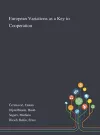
European Variations as a Key to Cooperation
3 authors - Hardback
£38.20
Ernst Hirsch Ballin is Distinguished University Professor at Tilburg University and, as Professor of Human Rights Law at the University of Amsterdam, President of the Asser Institute for International and European Law in The Hague. In 2005, he was elected to the Royal Netherlands Academy of Arts and Sciences (KNAW). Professor Hirsch Ballin studied Law at the University of Amsterdam and was awarded his doctorate with ‘cum laude’ honours in 1979 with a thesis on public law and policy (Publiekrecht en beleid). He has worked at the Law faculty at Tilburg University since 1 July 1981, with interruptions during periods when he held political offices.
Ernst Hirsch Ballin was the Minister of Justice from 2006-2010 (with Prime Minister Jan Peter Balkenende) and 1989-1994 (with Prime Minister Ruud Lubbers). From 1989-1994 he was also Minister for Netherlands Antilles and Aruban Affairs and from February-October 2010 Minister for the Interior.
Hirsch Ballin was a member of the Lower House of Parliament from 1994 to 1995, and sat in the Upper House from 1995 to 2000. From 1999 to 2000 he was a member of the Convention charged with drawing up the EU Charter of Fundamental Rights. He was subsequently appointed to the Dutch Council of State (2000-2006), becoming chairman of the Administrative Jurisdiction Division in 2003.
Huub Dijstelbloem
Huub Dijstelbloem is Professor of Philosophy of Science and Politics at the University of Amsterdam (UvA) and Senior Researcher and Project Leader at the Scientific Council for Government Policy in The Hague (WRR). He studied Philosophy (MA) and Science Dynamics (MSc) at the UvA and in Paris at the Centre de Sociologie de l’Innovation (CSI) of the Ecole des Mines. He completed his PhD at the UvA at the Department of Philosophy. Huub is involved in public debates about science, technology and democracy and is one of the initiators of Science in Transition and co-founder of the Center for Public Imagination . His current research is concerned with security policies and migration issues and focuses on the ‘politics of visualization’ and ‘surveillance and counter-surveillance at the Southern borders of Europe and the United States’.His recent books and co-edited volumes include Het huis van Argus. De waakzame blik in de democratie (Boom, 2016), Bestemming gewijzigd. Moderniteit en stedelijke transformaties (2013), Migration and the New Technological Borders of Europe (Palgrave, 2011), Onzekerheid troef. Het betwiste gezag van de wetenschap (Van Gennep, 2011), Het gezicht van de publieke zaak. Openbaar bestuur onder ogen (Amsterdam University Press, 2010), De Migratiemachine (Van Gennep, 2009) Rethinking the Human Condition. Exploring Human Enhancement (Rathenau, 2008) and Politiek vernieuwen. Op zoek naar publiek in de technologische samenleving (Van Gennep, 2008).
Mathieu Segers
Mathieu is a professor of Contemporary European History and European Integration at Maastricht University and Dean of University College Maastricht. From 2008 - 2016 he was a Senior Lecturer in European Integration and International Relations in the Department of History and Art History in the Faculty of Humanities at Utrecht University (UU). A political scientist by training, he obtained his doctorate as a historian. His academic work is multidisciplinary and situated at the interface of the social sciences and humanities. He is columnist for the FD (Financieele Dagblad) newspaper and produces a weekly Europe column for Radio 1 Vandaag. Previously, he was Senior Lecturer in European Integration and International Relations, Utrecht University.